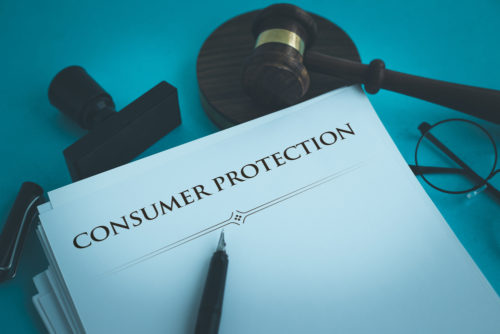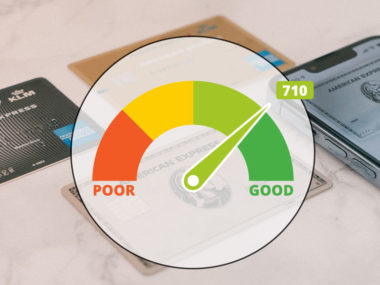There is no doubt that America is largely defined by consumerism. Once credit cards and bank cards joined the market as available forms of payment, suddenly our wildest dreams were only a swipe away.
But along with this new age in consumerism came a new age of theft. Just as in nature — where predator and prey are constantly adapting, pushing and pulling, to get ahead — so does the thief and the mark adapt. In this case, the predator is scammers, and your wallet is the prey!
But luckily the federal government, and many state governments, have found ways to curb some of the threats that consumers face. With the creation of consumer protections specific to your credit score, millions of Americans can sleep easier at night.
However, if you ever find yourself in an unfortunate situation where you might need to rely on consumer protections, how are you supposed to make sense of your rights? Knowledge is power, so here is a breakdown of the most important consumer protections you should know related to your credit, and how each of them protect your credit score and yourself.
Bank and Credit Score Protections
Our credit score has a strong presence in our lives. It can affect everything from our car loans to employment. Housing, transportation, and our careers can all be on the line if your credit score plummets. Of course, if you’re a frugal planner, everything should work out fine as long as you keep your credit score high, right?
Unfortunately, identity theft and fraud are far too common in our modern age. Hence why the federal government — through the Federal Trade Commission — has stepped up and created the Fair Credit Reporting Act (FCRA) and the Fair and Accurate Credit Transaction Act (FACTA).
These acts together (the FACTA added in 2003) allow consumers the ability to evaluate their own consumer report for free (a separate report from a credit report), dispute inaccuracies, and provides those who have been a target of identity theft the ability to fight their case to improve their score. Consumer reports are unique in that they show accounts and checks ordered in your name, whereas a credit report looks at your credit history. These acts are aimed to make the credit bureaus more transparent for the consumer, and are important for studying and understanding your credit score.
But the credit bureaus are not the only institution being targeted by consumer protections. Banks are also under scrutiny by the law and are subject to the Truth in Lending Act (TILA). TILA is meant to protect consumers from deceptive lending or unfair practices by banks or other creditors. It requires these institutions to disclose the full amount of a loan, including the total amount estimated to be paid by interest or other costs, at the time of signing so the consumer is making a fully educated decision. This law also allows consumers to cancel the loan with no penalty within three days of signing if it is a mortgage or refinancing type of agreement.
Outside of these federal laws, each state has their own collection of consumer protections related to fraud and deceptive practices. You can find specific protections related to your state and how to contact the proper authorities here.
What to do When You Need Consumer Protections
If you ever find yourself in the unfortunate situation where you need to rely on your consumer protections, how should you start? Here is a list of scenarios to help you figure out who to contact, and what you should note in your journey to fixing the problem:
Your Identity is Stolen and Your Score is in Danger
Sometimes surprises happen. No matter how vigilant you might be about guarding your high credit score, sometimes thieves can still get their hands on your information. If you notice your score is starting to decrease, or there are some discrepancies on your free annual credit or consumer reports, then you should immediately contact each credit bureau and dispute the claims. The sooner you address the errors, the better your chances of getting the situation under control.
Once your bank and the credit bureaus are able to sort out the discrepancies, do your best to guard your account and update all your information. Order new numbers for your debit and credit cards, place a 90 day fraud alert on your credit reports, and fill out an ID theft complaint with the FTC. Additionally, you can contact the Social Security fraud alert department or order a new driver’s license from your local DMV if those ID’s were used by the thief.
Credit repair services can also help you navigate these tough situations, if you need the extra help. However, it’s important to remember that you have the right and ability to report or dispute fraudulent charges or accounts for free to any of the credit bureaus. Credit repair services can often help you do this in a more timely manner.
You’re the Victim of Deceptive Lending or Scams
If you feel uneasy about any loans you’ve signed recently, or you’ve found yourself the victim of a scam, the Federal Trade Commission and your State Attorney’s Office wants to know about it. You can report any scam calls (“robocalls”), scam loan offices, or fraudulent bank activities to the FTC through their online complaint form. They use this information to investigate the organization in question, and release an annual report about the type and amount of complaints received each year.
Additionally, you should notify law enforcement as soon as possible. Filing a proper police report can be helpful in recovering any money you may have lost due to a scam. After that, you can notify your bank, the Social Security Office, or any other office of identification that you feel may have been compromised due to the scam. The sooner you tell someone about a scam, the better your chances of recovering your freedom and saving your bank account.
Your Credit Card Company or Loan Office Charges You Too Much
Consumer protections also extend to credit card and loan payments through the Fair Credit Billing Act (FCBA). The FCBA provides guidelines for both consumers and creditors that include procedures to help manage disputes regarding billing statements. Not only can dispute help drop the first charge, but additionally any interest accrued on the billing error has to be dropped if the claim is confirmed. Examples of billing errors range from charging the wrong account, to calculation errors, or charges for goods that haven’t been received.
If you find yourself the victim of a mistyped bill, or the loan office is demanding more than you agreed to pay on a monthly basis, then you have the right to dispute the claim with the bank. You legally must notify the credit office — in writing — within 60 days of receiving your statement, and the creditor must acknowledge the letter within 30 days of receiving it. If they refuse or do not acknowledge your note, contact the FTC to report an issue.
Consumer Protections and You
There are a plethora of things that can happen to your credit score throughout your lifetime, but they don’t have to be so devastating that you can’t recover. Luckily, consumer protections exist to help your life be a little easier, and a little safer.
If you ever find yourself in a sticky situation, remember that consumer protections are there for you to fall back on when you need them. It’s thanks to these protections that you don’t have to live in fear of your credit cards, your loans, and your credit score being impacted by thieves and scammers.
Want more information on scammers and how they can affect your credit score? Visit our credit score resource center for more articles and guides. If an entry appears on your credit report in error, but not necessarily as identity theft, consider writing a dispute letter to the credit bureaus.
Image Source: https://depositphotos.com/





